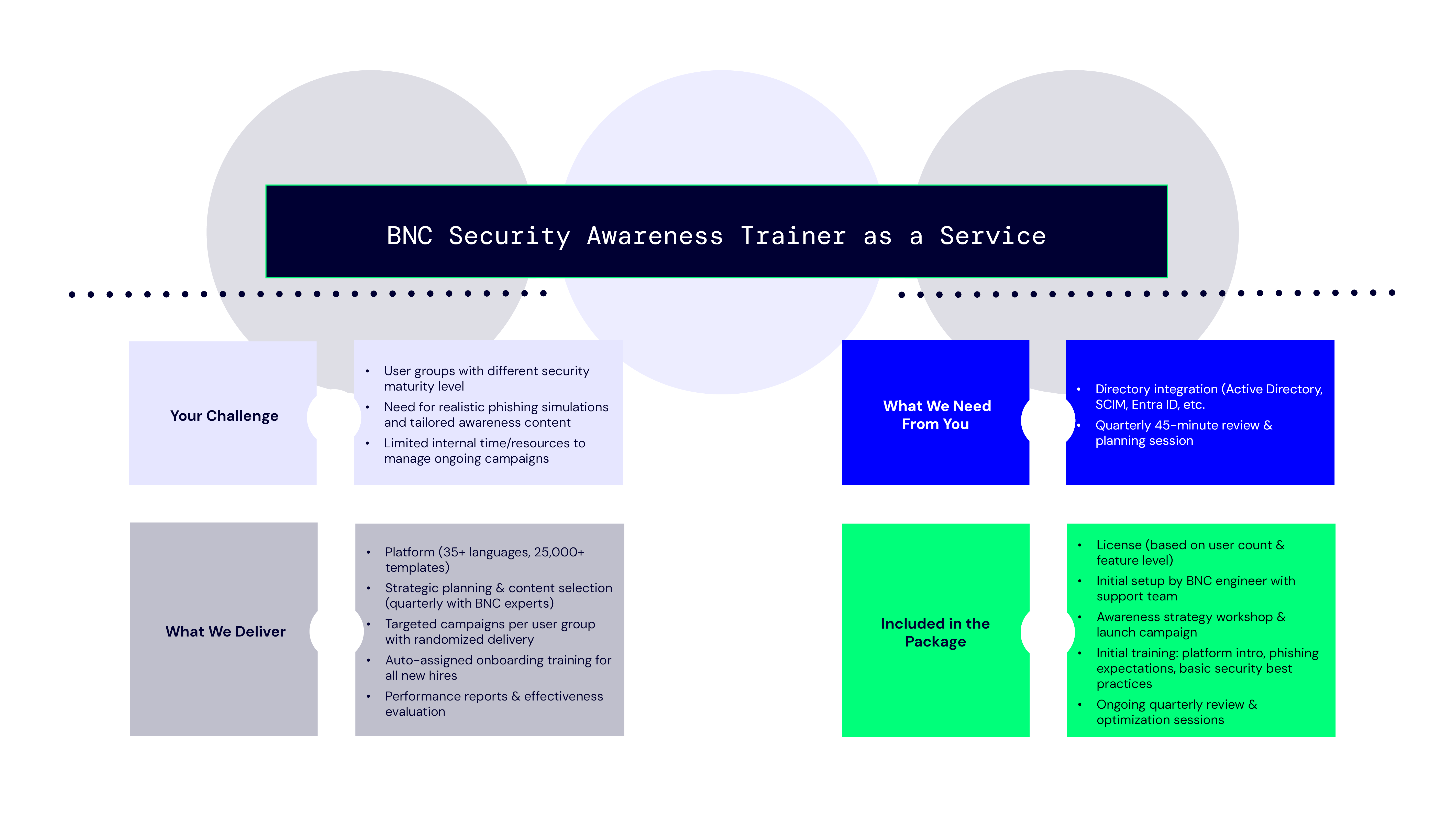Security Awareness
Whitepaper: Building Resilience with the Right Strategy: Setting Up IT Security Effectively
A guide to creating lasting security
Read nowTailored Solutions for Real Security Needs
A recent study by SWISS CYBER SECURITY reveals that over 70% of companies view employees as their greatest security risk. We address this challenge by customizing security measures to align with your team's daily operations. Our dynamic programs are designed to meet the specific requirements of each role within your organization, fostering a culture of continuous vigilance and responsiveness. By integrating security into daily workflows, we ensure that it becomes a lasting priority rather than a one-time training event.
Our security awareness initiatives are specifically customized to fit your company's unique environment, ensuring they are both relevant and immediately actionable.
We provide content directly aligned with your daily tasks, allowing you to immediately apply what you've learned in real-world situations.
Our offering includes role-specific training and resources tailored to various positions within your company, from managers and IT administrators to office staff and operators. This ensures that each team member receives the appropriate support for their specific responsibilities.
BNC Security Awareness Trainer as a Service
BNC combines a powerful platform with personal consulting and ongoing support – from strategic planning and realistic phishing simulations to performance measurement.
Our Security Awareness Trainer as a Service helps you select training content tailored to specific target groups, automate its delivery, and continuously improve it through regular reviews.

Relevance in Everyday Work
For security awareness to be effective long-term, it must be directly connected to employees' daily tasks. Generic, repetitive programs fail to engage staff or address unique challenges. Instead of using a one-size-fits-all approach, it's crucial to tailor security initiatives to meet the specific needs of each department, ensuring relevance and engagement.
Risks of Negligence
Even the most robust security policies are ineffective if employees are unaware of them or fail to understand their purpose. A continuous, well-structured security awareness strategy is essential to mitigating identified information security risks. This strategy should incorporate diverse approaches, such as phishing simulations, and leadership-focused tabletop exercises, to equip teams for potential crisis situations.
Challenges of Outsourcing
Outsourcing security awareness programs to external providers can create issues, particularly when standardized content is used that doesn’t align with your business processes. An effective awareness program requires leadership involvement to define relevant, business-specific topics that resonate with employees and support meaningful engagement.

Current measures for threat defense
To effectively respond to new threats, it is important to establish a connection to real events. This can be achieved by anonymously sharing personal security incidents or by analyzing current issues in the daily press.
Convincing management
To highlight the importance of security awareness to management, a one-time test can be beneficial. Various methods such as phishing simulations, table-top exercises, or security audits with gap analyses provide practical insights and compelling results.
Conclusion: BNC—Customized for Your Success
Our goal is to cultivate a lasting culture of vigilance and security within your organization, ensuring continuous learning and development for your employees. Together, we will implement effective and long-term security policies that evolve with your company's needs.

Blog: Security Architecture & Design
Discover how a structured security architecture protects your IT infrastructure from threats and ensures long-term resilience.
FAQ Security Awareness
-
Who should be responsible for carrying out security awareness campaigns?
Often, the internal IT department or sometimes HR is asked to manage security awareness programs. However, in our view, this should be a responsibility taken on by the CISO or management.
The implementation can then be delegated internally or externally, but the guidelines for the program, its objectives, and the topics to be addressed should be defined by security-oriented leaders. -
How can I demonstrate that our security awareness program is currently effective?
A continuous awareness program should produce measurable results alongside training sessions, allowing for the documentation of progress. This also helps in adapting the program to the needs and knowledge levels of the participants.
-
Why is a one-time training not enough?
Many organizations provide training during onboarding, and some hold a security day every few years. However, the IT landscape and accompanying security situation change so rapidly that this frequency is insufficient for employees to recognize and defend against current threats.
Therefore, it is more effective to integrate numerous small awareness measures into daily routines and to vary the important behavioral practices so that the correct behavior becomes automatic. -
Are there affordable and effective SaaS services for security awareness?
There are many providers in the market that offer content for awareness programs, conduct attack simulations, and measure participant performance. However, this alone is never effective and can be demotivating over time if there is no connection to employees' actual work. We believe it is essential to utilize these tools to deliver tailored content that aligns with employees' roles, adjusting it to fit the organization and varying it over time.
Ultimately, it is not just about the tool itself but rather about how these tools are applied in combination with other awareness measures (such as internal audits, training, and exercises) to achieve long-term improvement in security awareness.
